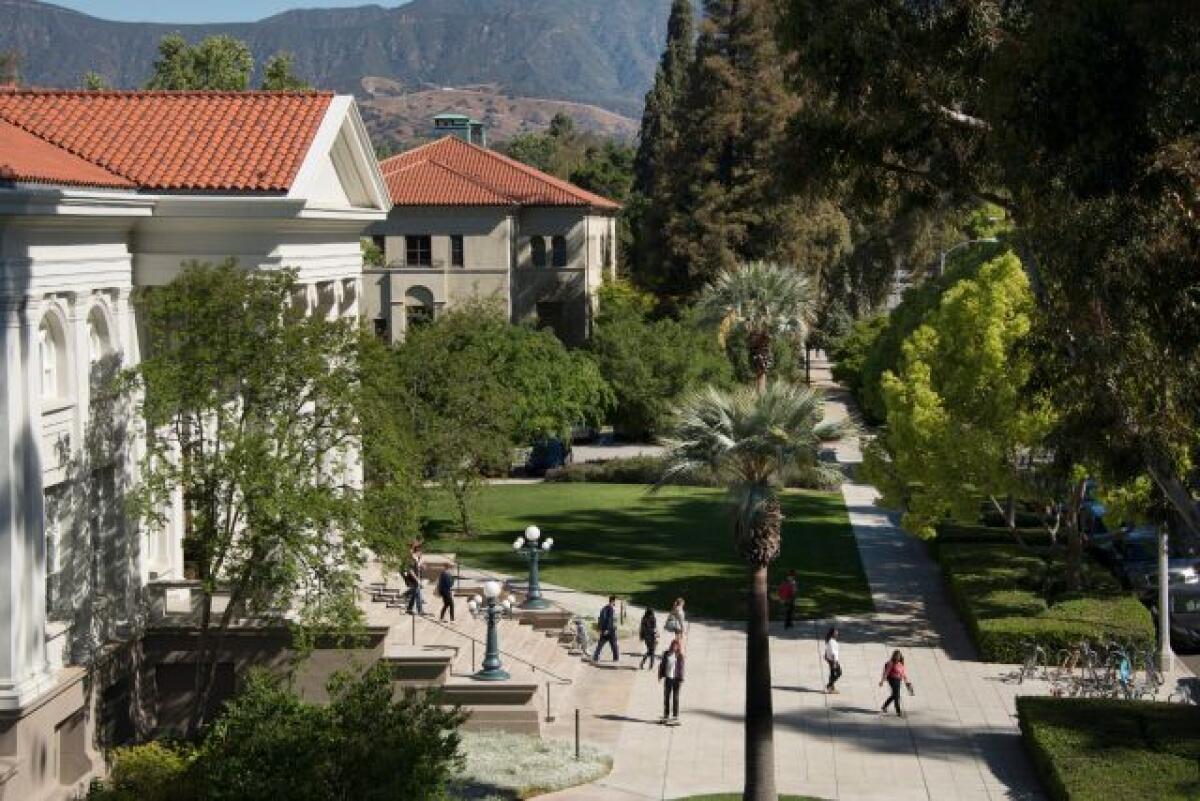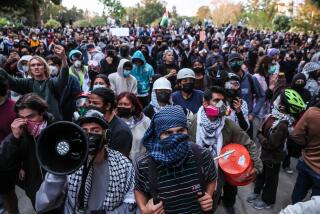20 Pomona College protesters arrested after storming, occupying president’s office

- Share via
What began as a peaceful pro-Palestinian demonstration on Friday afternoon at Pomona College quickly devolved after protesters stormed and then occupied the college president’s office. By the end of the evening, 20 students had been arrested and booked by riot-gear-wearing local police forces.
Nineteen students were charged with misdemeanor trespassing and one with obstruction of justice, according to the Claremont Police Department. Police from Claremont, Pomona, Azusa and La Verne responded to the scene.
The protest started over the college’s dismantling of a piece of student-erected pro-Palestinian protest art on the Claremont campus that had been standing since March 28.
The 32-foot-long, eight-paneled “apartheid wall” outside the Smith Campus Center was a physical and artistic protest designed to highlight “the unequal treatment of the Palestinian people living under the brutal conditions of the illegal Israeli Occupation,” and underscore the administration’s refusal to heed the will of students, who voted in February for the college to divest from companies seen as aiding Israel.
“Civil disobedience and peaceful protests by students were met with tactical gear and assault rifles,” wrote members of the Claremont Consortium Faculty for Justice in Palestine in a statement about the event. “Students who are scheduled to graduate in less than a month are being threatened with suspension for non-violent protest. This response is shameful.”
A letter sent out Friday by Gabrielle Starr, the Pomona College president, described the situation as “an escalating series of incidents on our campus, which has included persistent harassment of visitors for admission tours.”
She said protesters had refused to identify themselves to campus authorities, and had verbally harassed staff, “even using a sickening, anti-black racial slur in addressing an administrator.”
On Friday morning, students were told the campus would be taking down the wall. Many students had been camping there since the wall was erected in late March, according to Heather Ferguson, a professor of history at Claremont McKenna college. That’s one of the five undergraduate campuses — including Pomona — that collectively, with two graduate schools, make up the Claremont Colleges. She said they’d already packed up and disassembled their encampment the night before, in anticipation of rain.
Eve Oishi, a professor of cultural studies at Claremont Graduate University, said she stopped by the wall late Friday morning to drop off books and snacks for the few students sitting at a table nearby. They requested she bring “unhealthy snacks,” she said, because all the donations they’d been receiving were healthy snacks, such as granola bars, fruit and nuts.
The wall consisted of eight wooden panels including maps of Palestinian territory since 1946, and large lettering with phrases such as “Disrupt the Death Machine,” “Apartheid College; We are all Complicit,” and “Smash Imperialism, Long Live Int’l Solidarity.”
Oishi said the wall “was not highly unusual at all” in terms of the kinds of art, installations and protests often seen around campus. “I don’t understand why it was seen as such a threat.”
At around 1:15 p.m., three pick-up trucks pulled up to the wall, and college staff got out and began taking it apart , according to Ferguson and a student, who asked not to be identified for fear of retribution by the administration.
The dismantling was done “in preparation for events scheduled on Sunday, and in line with our policy,” wrote Starr in a statement, describing the “occupiers” as masked, which is against college policy.
It was at this point, alleged Starr, that the students “proceeded to verbally harass campus staff” and used a racial slur.
According to a statement from the Claremont Consortium Faculty for Justice in Palestine, college staff removed half of the installation’s panels, while students “protected the other panels from removal.”
Ferguson and the student said other students and faculty began to gather in solidarity and to bear witness. They said a crowd of 50 to 70 people began chanting pro-Palestinian rallying cries, such as “Free, free, free Palestine,” “Israel bombs, Pomona pays, how many kids will you kill today?” and “Gaza, Gaza, head held high, we will never let you die.”
At 4 p.m., 18 of the demonstrators entered Alexander Hall, “under false pretenses,” according to Starr, and made their way up a staircase and into Starr’s office.
According to a news release from Pomona Divest from Apartheid, “the 18+ students sitting in Starr’s office were barricaded in by Campus Safety Officers, who positioned themselves in front of the exits.”
Fifty more protesters spilled into the building in a second wave, after a protester unlocked a door to let them in. They occupied the hallway outside Starr’s office.
According to Ferguson, who was standing outside Alexander Hall, seven squad cars arrived on College Avenue. But they soon left.
Roughly 20 minutes later, a fleet of about 20 patrol cars arrived from a variety of local jurisdictions — including LaVerne and Azusa. She said some of the officers went into the building, while the others remained outside.
Those that went in, according to the Claremont Courier and Ferguson, wore riot gear, and then exited with the arrested students. She said they arrested another student who was outside, but who got in the way as the police were leaving.
Social media photos and videos of the events show police physically pushing student reporters out of the room, and closing window blinds to prevent them from documenting the situation. Other videos show a chaotic and heavy police presence.
The arrested students were taken to the Claremont Police Department, where a crowd of more than 100 demonstrators quickly grew.
The students’ attorney, James “Jaime” Gutierrez, of the Gutierrez Law Firm, said he was not allowed in to see his clients and that the police department’s watch commander prohibited his entry into the building. He said he was told by both his clients and a police officer that they were not read their Miranda rights.
“This is the first time anything like this has ever happened to me,” he said. “Where a law enforcement agency is prohibiting me from seeing my clients, much less a watch commander about speaking to my clients.”
By 12:20 a.m., the 20 students had all been released.
According to Oishi and Ferguson, the students were from Pomona, Scripps and Pitzer colleges.
Ferguson said the Pomona students were served “Emergency Interim Suspension” notices while in jail, and have been expelled from campus.
One student shared their notice with The Times. The notice claims the suspension was given in order “to ensure the safety and well-being of members of the College community...” and bans the student from entering any of the colleges on the campus, engaging in any in-person or virtual campus events or activities, attending classes, eating in the dining hall, entering residence halls, utilizing libraries or given any other access.
Suspended students have 30 hours from receipt of the notice to petition the suspension and campus ban, which will be reviewed by a Preliminary Sanction Review Board.
Effectively, said Oishi, the suspension means they were “not allowed back into their dorm rooms. Some of them are a month away from graduation. They have no place to to stay. No way to eat, no way to get to finish their classes.”
Ferguson said a network of students and faculty came together to find housing for the students.
She said many of the students identify as people of color, and that many of those that had coalesced around the wall were students from marginalized communities who had found solidarity in the movement.
“This is a group of students who have found solace in each other and in the in the movement as a whole.”
In Starr’s statement, she wrote that any Pomona students involved in the protest would be subject to immediate suspension, while students from the other Claremont Colleges would be banned from Pomona’s campus and “subject to discipline on their own campuses.”
Ferguson said she is still shocked by the events of Friday night, but it “is probably a natural component of what happens when you call in what amounted to a SWAT team approach to a peaceful demonstration.”
“Regardless of what the Pomona College Administration thinks about this, this is a peaceful act of civil disobedience and it does not warrant such a strong police response. It’s actually extraordinarily difficult to imagine why anybody would think that would be an appropriate response,” she said.
In a statement Saturday, Pomona Divest from Apartheid said “protesters and students remain concerned for the risk that this escalation causes for people of color on campus.”
“As for the future of organizing for divestment,” the group said, “students in Pomona Divest from Apartheid and Claremont Colleges students are reaffirmed in their goals.”
Similar protests and arrests have popped up on college and university campuses across the nation — including Stanford, San Jose State and Brown Universities — in the wake of the Israel-Hamas War.
Times staff writer Andrea Chang contributed to this report.
More to Read
Sign up for Essential California
The most important California stories and recommendations in your inbox every morning.
You may occasionally receive promotional content from the Los Angeles Times.











